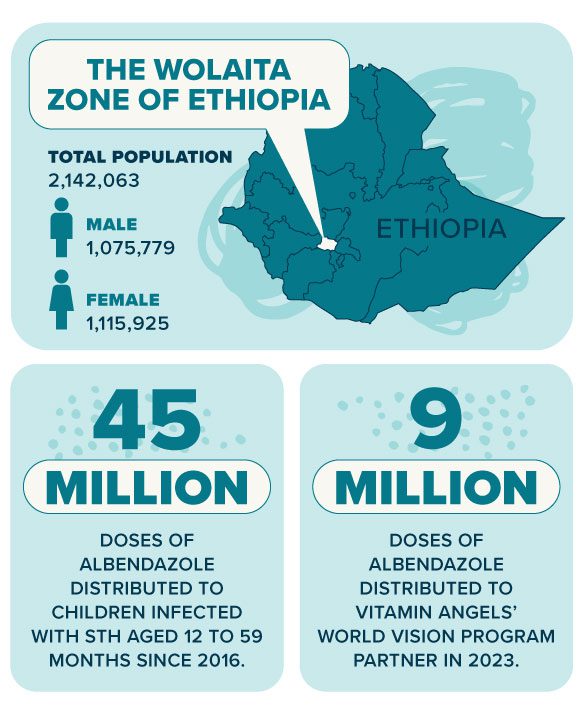Working Collaboratively in Ethiopia
Of the 20 diseases included on the WHO list of neglected tropical diseases, soil-transmitted helminths (STH) are one of the most prevalent. STHs are considered neglected tropical diseases (NTDs) because they inflict tremendous disability and suffering yet can be controlled or eliminated.1 The infection rates are particularly high in sub-Saharan Africa, which has some of the highest recorded prevalences of STH infections globally.2
Ethiopia is one of the most impacted countries in the region.2 A host of socioeconomic factors contribute to high infection rates in Ethiopia, including one of the world’s lowest quality drinking water supply and latrine coverage.3 One study estimates that nearly half of the school children tested in one region in Ethiopia were infected with at least one STH, and the majority of the students had a light STH infection.4 Other research indicates that STH infections are the second most predominant cause of outpatient morbidity in Ethiopia.3
STH infections have a pronounced impact on children in their formative years of development and can leave children nutritionally and physically impaired.2 Extraordinary physical and cognitive development takes place between 12 – 59 months, and young children infected with STH at this age are particularly susceptible to the damage resulting from undernutrition.
Deworming is known to be a highly cost-effective public health intervention.4 Administering Albendazole, an anti-parasitic, helps ensure optimal child health and nutrition. Giving children a chance at a healthier life sets them up for developmental and economic success throughout their lifetime.

The Worm Project has supported Vitamin Angels’ deworming work in Ethiopia since Vitamin Angels began distributing Albendazole in 2016. Since then, Vitamin Angels has distributed over 45 million doses of Albendazole for children infected with STH aged 12 to 59 months.
In 2023, Vitamin Angels will distribute 9 million doses of Albendazole to our Ethiopia program partner, World Vision which works alongside the Ministry of Health (MoH) to plan and offer biannual mass distribution campaigns that align with the school year, October through June in Ethiopia, as well as via community mobilization programs.

Technical Manager, STH/SCH Transmission, Break Project World Vision Ethiopia Milkias Lakew shared the following update: “Through a generous donation obtained from Vitamin Angels, Break Project World Vision Ethiopia continues to support the Ethiopian Federal Ministry of Health’s (FMOH) yearly albendazole distributions. We also offer technical support for mass distribution of deworming coverage to break the transmission of STH.”
Milkias continued, “Over the past five years, we’ve worked within the structure provided by the FMOH to establish a social network named Health Development Armies (HDAs) that operates in five select areas. While mothers in Ethiopia traditionally take children to health care visits, fathers play a strong role in health care decisions. So, we’ve conducted social behavior change campaigns designed to work within the local context and consider the communities’ way of life.
While attending a recent distribution, I met a woman named Zenebech, a mother of two from Chama Himbecho, Boloso Sore district of Wolaita. Zenebech was there with her daughter, Elshaday, who had just taken her third dose of Albendazole. Zenebech expressed tremendous enthusiasm and gratitude for the impact we’re making in her community and the transformation she had witnessed in Elshaday’s health as a result of the nutrition interventions we provide.”
“Zenebech told me that prior to the medication, her daughter had a lot of distress in her belly. She noted that she had been underweight since early childhood, used to cry a lot, had no appetite, had a bloated belly, and had diarrhea often. Zenebech talked about going to the local health center to get her daughter help, but there she found no solution. They even took a loan from a money lender and asked for contributions from friends and family so they could seek medical treatment at the local hospital but nothing helped until she came to our distribution.”

“Zenebech says, thanks to Albendazole, her daughter is now enjoying a healthy life. She goes to school, spends time playing with his friends, does chores, and her appetite is back, and she eats everything that she desires.
As I listened to Zenebech’s story, I couldn’t help but feel inspired. This simple act of administering Albendazole had made such a big difference in her life, her daughter’s life, her family’s life and represents the impact we’ve made in the lives of so many in our community. I am proud of the impact we have on the lives of those around us.”
References
- Centers for Disease Control. (2022). Neglected tropical diseases (NTDs). https://www.cdc.gov/globalhealth/ntd/diseases/index.html
- World Health Organization (WHO). (2023). Soil-transmitted helminth infections.
- Tefera E, Belay T, Mekonnen SK, Zeynudin A, Belachew T. Prevalence and intensity of soil transmitted helminths among school children of Mendera Elementary School, Jimma, Southwest Ethiopia. Pan Afr Med J. 2017 Jun 6;27:88. doi: 10.11604/pamj.2017.27.88.8817.
- Sartorius B, Cano J, Simpson H, Tusting LS, Marczak LB, Miller-Petrie MK, Kinvi B, Zoure H, Mwinzi P, Hay SI, Rebollo M, Pullan RL. Prevalence and intensity of soil-transmitted helminth infections of children in sub-Saharan Africa, 2000-18: a geospatial analysis. Lancet Glob Health. 2021 Jan;9(1):e52-e60. doi: 10.1016/S2214-109X(20)30398-3.
